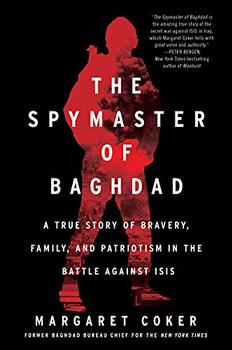Summary | Excerpt | Reading Guide | Reviews | Beyond the Book | Readalikes | Genres & Themes | Author Bio

A True Story of Bravery, Family, and Patriotism in the Battle against ISIS
by Margaret Coker
When Harith was still a toddler, the family who lived in that house disappeared one night. The father, mother, and three children were all gone. The following day, the neighbors all pretended not to have heard or seen anything, and soon afterward the entire neighborhood had erased them from memory. It was a time of war, when men were being drafted for the front lines, and Saddam believed that Iraq's majority Shiites would revolt against him on secret orders issued by the revolutionary government in Tehran. Jails were overflowing with people that Saddam's secret police had ripped from their homes and pulled out of Shiite mosques on suspicions based on paranoia rather than evidence. Few such prisoners were heard from again.
Iraqis had a fervent belief in the world of djinns, spirits that could be forces of good and evil. One winter afternoon, when Harith and his friends were thirteen, they were walking next to the abandoned building when Ali cried out. He swore that he saw an ifrit, a kind of ghost known to haunt ruins, walking around inside. No one else saw it. But no one doubted him, either. The family that had once lived there must have died in an unspeakable way, the boys reasoned, otherwise a relative would have come to claim the property or sell the land. Instead, month after month the colorless, crumbling structure slowly sank into itself, its broken windows falling out. None of the boys wanted to risk the wrath of the ifrit or be touched by the curse that had doomed the family. But they didn't want to admit to being scared, either. The next day, when Wissam suggested a different route home, the boys agreed with alacrity, without mentioning another word. But word of the ifrit quickly spread, and so, too, did the trio's refusal to walk on the street by the haunted house.
The neighborhood bully, a boy named Hussein who was a year older than Harith, saw an opportunity for mischief. Faggots, he yelled at the three friends. Look who is afraid of their own shadows.
Ali and Wissam obeyed the rules of the jungle. They decided not to antagonize the bigger boy. Harith, however, lost his cool. Fuck your mother, he shouted back. I'm no faggot and I'll prove it.
When school ended that day, Harith, Ali, and Wissam were joined by a group of at least ten other boys, including Hussein. In the five minutes it took to walk from the schoolyard to the haunted house, Hussein and his gang kept up a nonstop prattle of taunts, sure that Harith would break off and run away. Neither Ali nor Wissam remembered Harith saying a word. He was in a different zone. When they reached the abandoned house, Harith didn't even flinch—he walked swiftly to the sagging doorway. Standing on the mildewed floorboards, he peered inside, hesitated for a moment, and then walked in, disappearing from his friends' line of sight.
Minutes passed. Yet Harith had not reappeared. Ali's heart raced, faster than a rabbit's caught in a trap. Harith's foolhardiness was going to be the death of him. The djinns, he thought, had trapped his friend inside. Ali yelled for Harith. Wissam did as well. But inside the house was silence. You killed him, Ali shouted at Hussein. The djinns have taken him!
Wissam urged Ali to go find his father, who worked in a shop just a couple of streets away. Someone had to go into the house to find Harith, but neither one could drum up the courage to do it himself. Ali broke away and, just as he was reaching the corner, he heard a loud laugh. He turned to see Harith back on the street near Wissam.
Ya Ali, you donkey. Come back. I'm not dead. At least not yet.
Ali never did ask Harith what had sparked his act of bravery that day. Years later, as an adult, Harith told his friend that he had an inexplicable urge to see what he was made of. A journey into the lion's den, is what he called it.
On the rough-and-tumble streets of Saddam City, where corporal punishment was the rule, families had an incongruous obsession with poetry—a nostalgia that evoked the golden era of Islam, when Baghdad was the center of the world and promoted scholars, scientists, and artists.
Excerpted from The Spymaster of Baghdad by Margaret Coker. Copyright © 2021 by Margaret Coker. Excerpted by permission of Dey Street Books. All rights reserved. No part of this excerpt may be reproduced or reprinted without permission in writing from the publisher.
Your guide toexceptional books
BookBrowse seeks out and recommends the best in contemporary fiction and nonfiction—books that not only engage and entertain but also deepen our understanding of ourselves and the world around us.